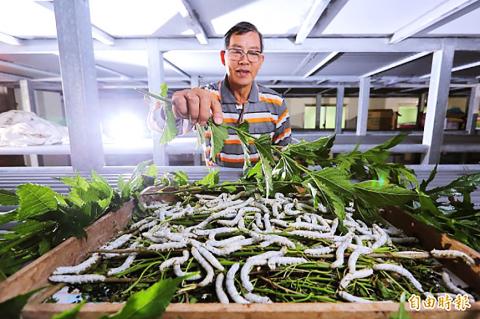One of just a few remaining silkworm farmers left in Taiwan, Tu Chuan-ming (涂泉明) said that he is determined to continue locally producing the material, despite its decline in the late 1990s.
The government at one time sought to establish a local silk industry and from the late 1980s to the mid-1990s, there were many shops on the roadside selling silkworms.
Science classes at schools still have students raise silkworms and observe their development from silkworm to silk moth, giving them a first-hand understanding of where the silk mentioned in history textbooks came from.

Photo: Lee Hui-chou, Taipei Times
The Taiwanese silkworm industry declined due to higher overhead costs in production compared with other countries, Tu said, adding that by 1992, the government had abandoned the project and was bailing out silkworm farmers.
“Silk is a valuable product loaded with history and cultural memory, and we should try to hold on to the industry, given that the government invested tremendous resources in it in the past,” Tu said.
He said the most tiring job is obtaining enough mulberry leaves from his 2 hectare mulberry field to feed the silkworms.
The average time between a silkworm being born and starting to produce silk is about 25 days, during which time the worm mainly feeds on mulberry leaves, Tu said.
On the farm, Tu attempts to make each silkworm spread its silk out into a level plane instead of a silk cocoon, he said, adding that each silkworm might produce 1,100m to 1,200m of silk thread.
The finished sheet of silk is wrapped in cloth and submerged in a pot of boiling water with baking soda and soap, Tu said.
The process removes any filth remaining on the raw silk and dissolves the glue that would otherwise hold the silk together as a cocoon, Tu said, adding that it would harden if this step were skipped.
The raw silk is removed from the cloth and rinsed in clear water before it is put out to dry, and people are then hired to pull the material until it is the size of a quilt, Tu said.
The average strength of each hired hand is different, so during the tugging process, the workers need to constantly change positions to ensure the consistent thickness of the quilt, he said.
Tu has also opened his silk farm to children, to raise ecological awareness, which he said is why he has continued to prop up the business even after the government retreated.
“I wanted more people to know about silkworms,” Tu said.
His son is now learning the ropes of managing the farm and is soon to take over operations, Tu said.

Beijing could eventually see a full amphibious invasion of Taiwan as the only "prudent" way to bring about unification, the US Department of Defense said in a newly released annual report to Congress. The Pentagon's "Annual Report to Congress: Military and Security Developments Involving the People's Republic of China 2025," was in many ways similar to last year’s report but reorganized the analysis of the options China has to take over Taiwan. Generally, according to the report, Chinese leaders view the People's Liberation Army's (PLA) capabilities for a Taiwan campaign as improving, but they remain uncertain about its readiness to successfully seize

Taiwan is getting a day off on Christmas for the first time in 25 years. The change comes after opposition parties passed a law earlier this year to add or restore five public holidays, including Constitution Day, which falls on today, Dec. 25. The day marks the 1947 adoption of the constitution of the Republic of China, as the government in Taipei is formally known. Back then the Chinese Nationalist Party (KMT) governed China from Nanjing. When the KMT, now an opposition party in Taiwan, passed the legislation on holidays, it said that they would help “commemorate the history of national development.” That

Taiwan has overtaken South Korea this year in per capita income for the first time in 23 years, IMF data showed. Per capita income is a nation’s GDP divided by the total population, used to compare average wealth levels across countries. Taiwan also beat Japan this year on per capita income, after surpassing it for the first time last year, US magazine Newsweek reported yesterday. Across Asia, Taiwan ranked fourth for per capita income at US$37,827 this year due to sustained economic growth, the report said. In the top three spots were Singapore, Macau and Hong Kong, it said. South

Snow fell on Yushan (Jade Mountain, 玉山) yesterday morning as a continental cold air mass sent temperatures below freezing on Taiwan’s tallest peak, the Central Weather Administration (CWA) said. Snowflakes were seen on Yushan’s north peak from 6:28am to 6:38am, but they did not fully cover the ground and no accumulation was recorded, the CWA said. As of 7:42am, the lowest temperature recorded across Taiwan was minus-5.5°C at Yushan’s Fengkou observatory and minus-4.7°C at the Yushan observatory, CWA data showed. On Hehuanshan (合歡山) in Nantou County, a low of 1.3°C was recorded at 6:39pm, when ice pellets fell at Songsyue Lodge (松雪樓), a